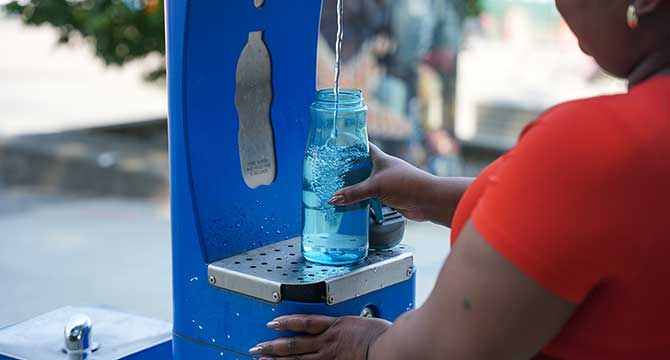
 City of Vancouver shares heat and wildfire smoke safety tips
City of Vancouver shares heat and wildfire smoke safety tips
As the summer season arrives, the City of Vancouver is reminding residents to get prepared and stay safe during hot weather.
What you can do to stay cool
When the weather gets hot, both indoor and outdoor temperatures can rise to dangerous levels. Extreme heat can cause illnesses such as heat exhaustion and heat stroke. This summer, residents are reminded to monitor both indoor and outdoor temperatures and make a plan to stay cool, whether it’s at home or by visiting an air-conditioned public space.
Indoor spaces without air conditioning can be hotter than outdoors. It is important to identify the coolest part of your home, make a cool kit, install a window air conditioner, or make low-cost home modifications prior to a heat event.
If indoor temperatures exceed 31°C, or you are unable to cool where you live, go to an air-conditioned place such as a cooling centre. For some people at greater risk, guidance from health partners indicates that it may be unsafe to spend time in indoor temperatures above 26°C.
Visit public cooling centres in most community centres and libraries, or other air-conditioned spaces such as shopping malls, or neighbourhood organizations to stay cool. Or plan to visit or stay with family, friends or neighbours who have air conditioning.
Checking on people can be life-saving
While extreme heat can impact anyone, some people are at greater risk than others and need to be prepared and supported. This includes older adults; people who live alone; people with chronic, underlying health conditions, including mental health conditions that put them at greater risk; and people with limited mobility and other disabilities.
We all have a role to play by supporting family, neighbours and friends during hot weather. Plan to regularly check on vulnerable people multiple times a day, especially later in the day when it is hottest. For signs of heat-related illness, visit Health Link BC's page on Heat-related Illness External website, opens in new tab.
City resources
During the summer season, the City deploys extra services to residents to help them stay safe during hot weather. These include more than 200 permanent water fountains across Vancouver, additional temporary fountains added during summer months, and misting stations available 24 hours a day, seven days a week.
When hot weather becomes dangerous, the City also adds services to help protect the health and safety of those most susceptible to heat. This includes activating cooling centres, monitoring spaces for people suffering from heat-related illness, implementing a support plan for tenants in our non-market housing facilities, and providing heat safety information and other supports like Cool Kits External website, opens in new tab through community partners.
Find places to stay cool or get the most up-to-date information by checking vancouver.ca/hotweather or the City’s social media channels (X, Instagram and Facebook).
The City is working in partnership with Vancouver Coastal Health, as well as community organizations like Neighbourhood Houses and urban Indigenous organizations, to help connect those susceptible to heat to critical information and supports.
Prepare for potential wildfire smoke
The City is also reminding residents to be prepared for potential air quality events this summer. Everyone is impacted by wildfire smoke differently. People with pre-existing chronic conditions, those who are pregnant, infants and small children, older adults, and people who have been diagnosed with a respiratory infection, may find smoky days harder, both physically and mentally.
There are City facilities with cleaner air available throughout the year. Go to a cleaner air space or cooling centre when you feel you need relief from wildfire smoke. Find a City facility near you at vancouver.ca/wildfiresmoke.
Stay informed
Download the Alertable app to receive alerts during extreme heat emergencies with information on City of Vancouver services and resources.
For more information on health External website, opens in new tab and safety tips during the summer season, please visit the Vancouver Coastal Health website External website, opens in new tab.